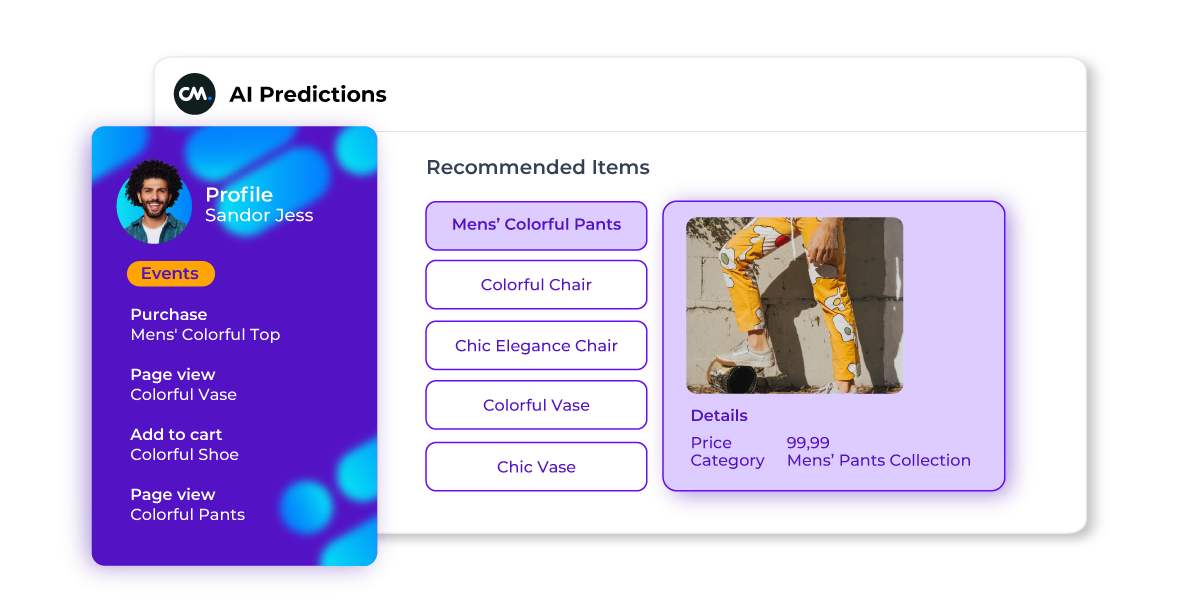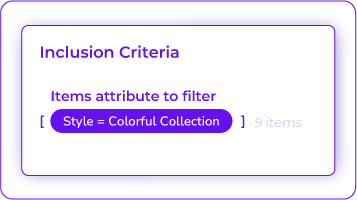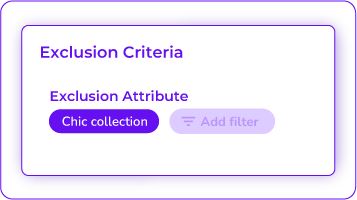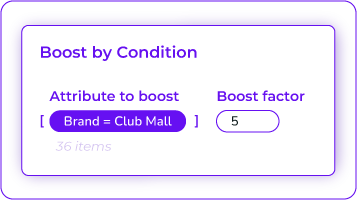
Engage individual customers at every touchpoint with on-brand tailored content and recommendations.
Automate tasks and suggest relevant content so your teams can focus on the bigger picture.
Drive longevity at every stage of the customer journey with personalized experiences at scale.
Remove the guesswork from personalization and let AI take the lead. Our AI Decisioning Engine analyzes customer behavior and preferences to predict the next buying stage, ensuring your team can deliver the right information and the right products at the right time.
Ensure your personalized content is delivered at the right moment on the right channel with AI predictions and automation.
Connect existing data sources and allow the AI engine to continuously learn with every interaction.
Gain transparency and view insights into why certain AI-driven recommendations have been suggested.
Increase ROI with personalization specifically matched to your business. Our AI Decisioning Engine enables you to align your personalization and business strategies based on tailored criteria.
Watch demo videoHighlight specific items and products to include in recommendations to boost interactions and conversions from customers.
Define specific items and products to exclude from recommendations and, therefore, will not be seen by customers.
Identify groups of items and products to boost recommendations to ensure more engagement from customers.
Use data to understand customers and make them feel understood in personalized campaigns, showcasing relevant products and guiding them through the buying journey to drive website traffic.
Create unique and engaging website experiences no matter the device with 1:1 personalization embedded in each touchpoint, increasing purchases, repeat visitors and customer loyalty.
Continuously learn about your customers with real-time data and provide them with fast, efficient and personal service, ensuring re-engagement and loyalty even after needing assitance.
Our AI Decisioning Engine seamlessly integrates with our service and marketing tools to create a unified customer experience and unify data across departments. It effortlessly connects to our Customer Data Platform, Mobile Marketing Cloud and Mobile Service Cloud.
Our Engagement Platform connects our AI Decisioning Engine with our Customer Data Platform, enriching 360-degree customer profiles with tailored recommendations.
Our Engagement Platform integrates our AI Decisioning Engine with our marketing automation platform to generate tailored recommendations and boost marketing campaigns.
Our Engagement Platform integrates our AI Decisioning Engine with our Agent Inbox, showing recommendations right next to customer conversations enabling agents to recommend products.
Through our partnership, we at Sligro delivered 30 million personalized promotions, achieved a 5% increase in conversion rates, and saw an 11% rise in location visits, significantly advancing our mission to support food professionals in the hospitality industry.
Sligro
There are many factors that influence the trip you are looking for, such as the travel group and the length of the trip. With the AI Decisioning Engine, we were able to offer a relevant and personalized offer to each customer selected from the large selection from across the travel group.
Mike de Block, CEO Bookit
The AI Decisioning Engine of CM.com provided Corendon with a predictive solution for a personalized approach for almost every aspect in marketing communications. More traditional channels such as print and telephone are also benefiting from these accurate predictions.
Ed Rice, Head of Commercial



Leave your information and get instant access to our 10-minute demo video. In which we will show you:
The real product in action - not polished marketing visuals, but exactly how it works.
How our Engagement Platform can help you get better results.
Step-by-step explanations of key features and benefits.
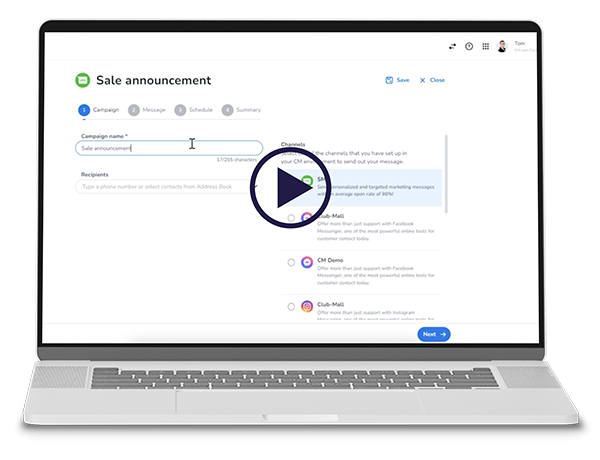
Artificial Intelligence (AI) has been in development for decades, but the way we use it today has changed dramatically. With the advent of ChatGPT and other applications, AI has suddenly become tangible for the general public. While it was previously used primarily for specific, often invisible applications (think fraud detection in banking or predictive maintenance in industry), it now actively assists in content creation, enhancing customer experiences, and streamlining processes. Within customer experience, three forms of AI are particularly relevant: generative, agentic, and predictive AI. In this article, we’ll break them down and explain how to leverage them effectively.
The insurance industry is known for its complex processes and heavy administrative load. Fragmented communication, outdated systems, and complicated policy conditions mean that finding the right information or processing changes often takes far longer than it should. AI agents can change that. They answer questions, pull real-time data from internal systems, and seamlessly trigger processes.
In today’s competitive global real estate market, agencies are flooded with inquiries on listed properties. Buyers expect instant answers about availability, pricing, and next steps — often outside office hours. For real estate agents, this creates a heavy workload: handling repetitive questions, scheduling viewings, and informing disappointed buyers when a property is already sold or oversubscribed. Without automation and smart workflows, agencies risk being overwhelmed, leading to frustrated buyers and missed opportunities for meaningful interactions. HALO, CM.com’s AI-powered engagement platform, helps real estate companies streamline these processes. AI agents work 24/7, provide human-like responses, and handle routine tasks instantly. This frees agents to focus on what matters most: building relationships and guiding serious buyers through the transaction.
The live events industry - from sports matches to festivals and concerts - is under pressure. Fans demand more, technology evolves constantly, and internal teams are stretched thin. In this shifting landscape, AI agents aren't here to replace people, but to amplify them - bringing structure, speed, and clarity where it's needed most.
AI agents aren’t just shaping the future they’re transforming how companies serve and connect with their customers right now. From answering service requests instantly, to guiding shoppers through a purchase, to spotting upsell opportunities in real time, the question is no longer if you should implement AI, but how quickly you can put it to work.
An AI platform isn’t just another tool you purchase. It’s the foundation on which your organization operates and innovates. The choices you make today will shape how you work in the future. While you may start with just a few agents supporting specific use cases, over time more processes will be taken over by agents. That’s why it’s critical to ensure the foundation you lay now is cohesive, scalable, and backed by solid governance and compliance.
The way consumers search for and process information online is rapidly changing thanks to AI. Where we used to type in search terms, scroll through dozens of results, and manually filter them, we are now getting used to having conversations. With ChatGPT, Google’s AI features, and other assistants, answers come faster and are more relevant. That same way of interacting is now taking over e-commerce at high speed. For retailers, this is the moment to step in: the webshop as we know it—where customers have to actively search themselves—is giving way to personal conversations that directly lead to action.
AI platforms are playing an increasingly important role in how companies organize their customer service and marketing. Whether you run a small support team handling large volumes of inquiries or manage an international organization processing thousands of interactions a day, choosing the right platform makes a big difference. But what AI platforms are out there? How do they work, and in which situations do they really shine? In this article, we compare six widely used AI platforms: HALO, N8N, Neople, Intercom, Zendesk, and Salesforce. We’ll explore their strengths and weaknesses and show which type of organization benefits most from each.
Chatbots have been a valuable tool in the automation journey, helping businesses handle simple tasks and provide instant responses to customers. However, as customer expectations evolve and business operations grow more complex, chatbots are no longer enough. The future lies in virtual agents: intelligent, autonomous systems that go beyond the limitations of chatbots to deliver seamless, personalized, and efficient interactions. This isn’t about choosing between two tools; it’s about embracing the natural evolution of automation. In this blog, we’ll explore how virtual agents differ from chatbots, why they represent the next step forward, and what they can deliver for your business.
Select a region to show relevant information. This may change the language.
